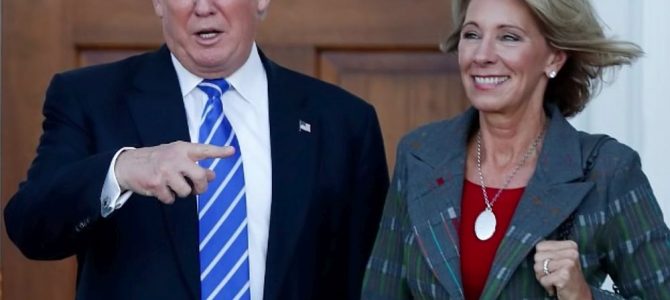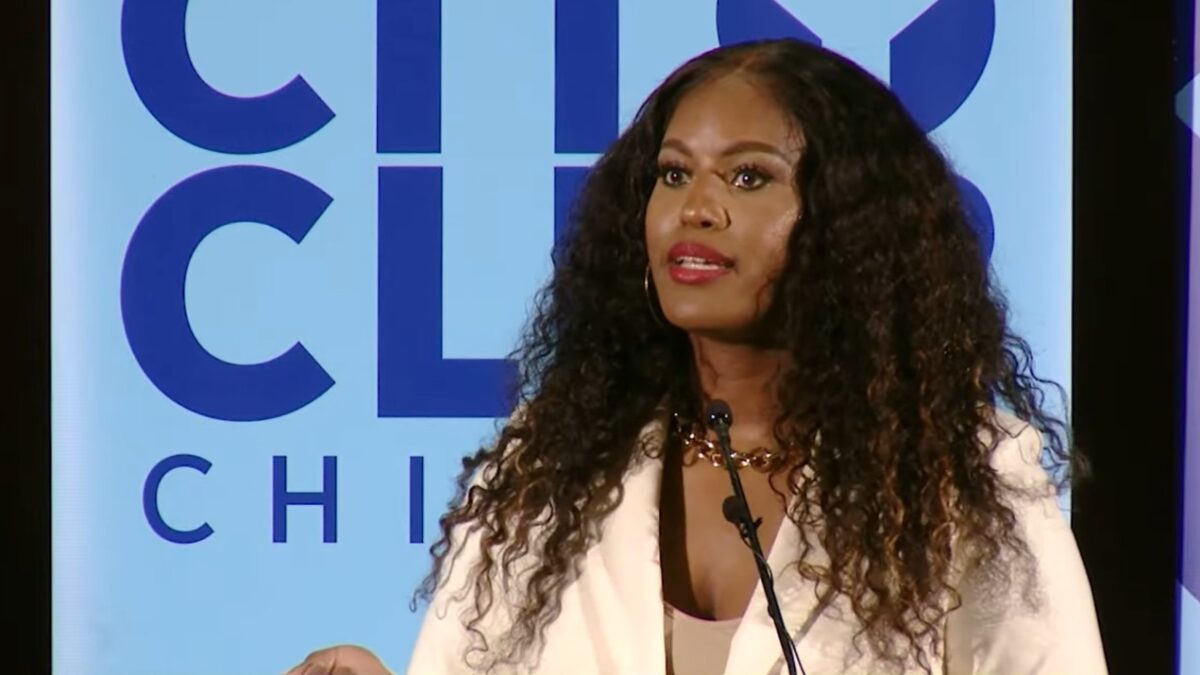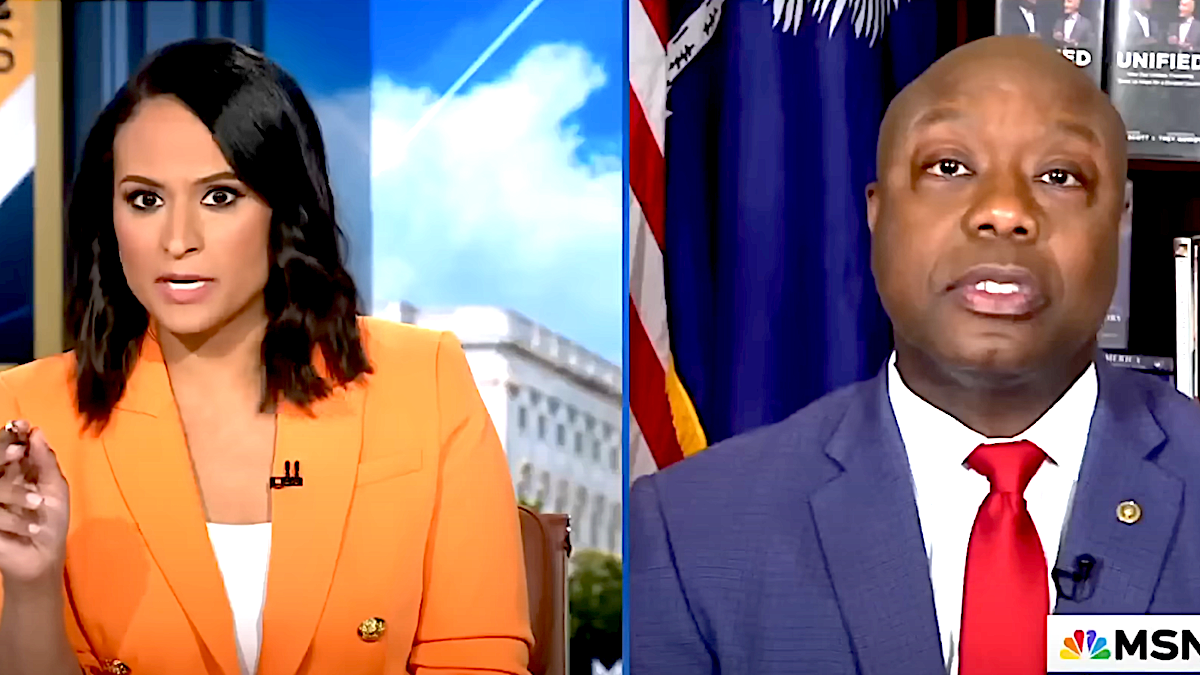
Absent something really strange—and 2016 has been full of that, for sure—billionaire Betsy DeVos will become Donald Trump’s initial secretary of education come hearings in January.
Teachers unions and others are already digging up dirt on DeVos and her family that Democrats will throw at her during the hearings, but given that education is usually a political sideshow (despite its crucial implications for our nation’s economic and cultural health), after an unpleasant few hours DeVos will be able to start moving her boxes and staff into Arne Duncan’s former office. Then what will she do?
Unfortunately for those of us who want to see federal power over education reduced—if not eliminated—lots of the problems with education policy are Congress’s fault. A good education secretary and president will not, therefore, follow President Obama and Duncan’s lead by ignoring Congress to legislate from the executive branch, no matter how tempting it would be to manipulate the levers of power to their tribe’s perceived advantage.
As David Harsanyi pointed out here yesterday regarding the filibuster, retaliation begets retaliation, and that cycle gets dangerous fast. The only way to end it is for Congress to make good laws that siphon the swamp collecting power inside the centralized administrative state, and sending that power back to its owners: we, the American people.
You’re About to Run a Horrifically Failed Agency
But that doesn’t mean DeVos needs to sit there and twiddle her thumbs while waiting for congressional Republicans to use the slim and rare window of opportunity voters bestowed by granting them the House, Senate, and presidency this November. She needs to take a big set of lessons state leaders have learned from implementing at the ground level the school choice policies she claims to love. That starts a basic principle Louisiana education wonk Neerav Kingsland calls “relinquishment.” I like the term, but not entirely his definition, so I’ll give my own: sending the people’s power back to them.
This is precisely what needs to happen in federal education policy. Since the U.S. Department of Education was established, nobody can point to one effective program it has run. Not one. I thought about qualifying that statement with “major effective program,” but in my mental rundown it applies even to smaller programs (tweet me if you know of any hard data otherwise—not “educated guesses,” unreplicable education studies, or shaky theories from very invested Bush operatives). No objective data finds that a single major federal program has had any effect on any of its stated national goals.
That’s a freakishly sickening reality. And this worse-than-dismal track record of the agency she’s about to take over ought to give DeVos some humility about her position. It suggests she should preside over a new era at this failure of a department—one focused on getting government out of families’ way, not paving yet another highway to education hell with good intentions about “helping the children.”
Practically speaking, how can she do that while not turning into an Obama-style education “czar” (i.e. petty little dictator)? I have some ideas.
1. Reverse Obama’s Illegal Executive Actions
As other conservative commentators pointed out after the 2016 election, since Obama did so many things through executive order, they can be immediately undone by a Trump administration. For one, President Obama imposed Common Core on the entire nation this way. While that can’t be reversed by executive order since the 30 pieces of silver he used to bribe states into it is long gone (and I don’t advocate bribing states, period), several of its effects can be mitigated through legal executive actions.
This would include, for example, Secretary DeVos issuing guidance to states stating that since federal law that gives the education secretary dictatorial power over state curricula and tests is so vague on its criteria for doing so, she finds the provision unenforceable until Congress specifies (preferably by eliminating this tyranny altogether, since Congress doesn’t know a damn thing about what each child should learn and when).
She can immediately change the Obama administration’s proposed guidance for the newly passed Every Child Achieves Act, which replaced No Child Left Behind. One key regulation that ticked off congressional Republicans was one known as “supplement not supplant,” which could give the federal government the power to tell states how they must structure public school funding, which can even include demands to redraw neighborhood zoning laws.
Another executive decree DeVos’s education department should reverse is the one interpreting the word “sex” to mean “gender” in Title IX, which the Obama administration has used to force schools to place biological boys into girls’ private areas, such as showers and overnight sleeping quarters on travel teams.
2. Refuse to Enforce Vague Statutes
Going further with the Common Core recommendation above, DeVos should have the department’s lawyers scour federal education law for vague commands, list these in order of greatest importance, and issue further guidance to states about which other provisions her agency will refuse to enforce since Congress has not made its will clear through specific language.
This sounds really boring but is an excellent tool for reducing federal micromanagement of schools, at least while DeVos is at the helm, because when Congress writes vague laws regulators take it as a license to impose their own personal priorities on the country. If Congress doesn’t know what it wants to have happen, it shouldn’t outsource power to the administrative state to make up the rules as bureaucrats go along. It should forego making a law altogether.
3. Bring In a Whip-Smart Legal Team
To do any of the above regulatory work, DeVos is going to need some good lawyers. She cannot rely on many of those the department already has because they are the same ones that have been aiding the Obama administration in doing precisely the opposite of what DeVos should be.
DeVos is a philanthropist, not a policy wonk. She has never held public office before, which gives her very little crucial experience with education policy minutiae. She needs people by her side who can capably fill in this deficiency. I suggest Kent Talbert, Emmett McGroarty, Robert Eitel, and former Texas education commissioner Robert Scott.
4. Do a Bureaucracy Audit
With the help of such a freedom-loving personal legal team, DeVos should immediately do an audit of her bureaucracy. An agency that ineffective ought to have plenty of waste, fraud, nepotism, and abuse to expose, and if she does it early in her tenure DeVos can rightly blame the mess on the Obama administration.
This will also give her ammunition to publicly push for reducing, restructuring, or even eliminating this waste of a federal department, which is essential if DeVos wants to get anything done during her tenure. She should expect that most of her 5,000 employees will feel about her the same way employees of a company Bain Capital got its hands on felt about Mitt Romney: the leader of a hostile takeover. A hostile bureaucracy full of federal lifers has millions of ways to delay and sabotage the goals of a President Trump and his education secretary whom few of them voted for and 60 percent said they would be embarrassed to work for.
5. Audit USDOE’s Data Handling
Not many people know this, but the U.S. Department of Education hosts and tracks the sensitive personal and financial information of millions of American students. A major way it does so, among other programs that begin at birth, is through its nationalized student loans bank (another activity that should end). Recent data breaches have exposed USDOE-held data to hackers. It has done little to rectify these problems, while embarking on initiatives to collect even more, and even more sensitive, information about Americans. Therefore, as Jane Robbins says, DeVos and company should immediately:
Initiate a thorough security audit of all data systems maintained by the Department of Education and immediately take steps to eliminate the security problems found. It’s a national scandal that the Department is allowed to operate a system that exposes sensitive student data to hacking and other unauthorized access.
6. Create a Plan to Erase Her Department
Progressives created the sprawling federal bureaucracy that DeVos is about to become a part of, and they specifically designed it to further their aims no matter who is in charge. Largely the only way to get rid of career bureaucrats is by having Congress rewrite the agency’s charter. Otherwise they essentially have tenure and will make DeVos’s (or any reformer’s) life a living hell.
“This will be an opportunity for her [DeVos] to put a system in place for options and establish that for a long time, and then I would make the obvious comment, “What are we even doing here anymore? Let’s get rid of this department,’” Larry Arnn, president of Hillsdale College, told Breitbart’s Susan Berry. “[I]f the plan goes well, he could foresee the education department being dismantled in five years. ‘If Betsy DeVos has a lot of power, then her successor would have that, too,’ he observes. ‘So, it would be better to get rid of her successor.’”
That means that if Congress wants to actually reform the federal approach to education policy, it needs to wipe the slate clean. It cannot keep handing power over to an unelected bureaucracy that outlasts all presidential administrations and even members of Congress. It needs to defund the U.S. Department of Education and turn most of its functions over to the states.
Rick Hess has written about what a bare-bones replacement agency could look like—one that largely performs the umpire function of “ensuring equal weights and measures.” I philosophically disagree with and think history has proven the folly of thinking the national government can perform just about any education tasks well, but pragmatically speaking would be thrilled to accept such a federal education department in exchange for our current one.
7. Refuse to Preside Over a Federal Voucher Program
Trump has been characteristically ambiguous about the details of his $20 billion school choice proposal. We know it’s going to be yuge, but we don’t know what the heck that really means. That may be good tactical policy, but if Trump is internally this malleable for education policy he runs the risk of destroying the school choice wildfire Republican leaders in the states have ignited in the face of an an adamantly opposed Obama administration.
This is indeed likely DeVos’s strong suit. Unless she’s an unusually lazy philanthrocapitalist (and reports suggests she’s not), she knows school choice research and structure pretty well, given her active funding in that arena through the American Federation for Children. So she should know from experience in Louisiana and Indiana, to name a few, that the more regulated voucher programs are, the more poorly they perform. This is because we do not know what regulations improve school quality. So imposing heavy regulations deforms the power of school choice, which generates bad results and therefore bad press that hurts its brand.
The federal government is nothing if not the font of ineffective, meddlesome regulations. If DeVos and Trump love school choice and the children it benefits, they will keep the federal government far, far away from them. They will turn education dollars back to the states rather than attempting to directly expand federal dollars—and thus federal control—to the nation’s private schools. Even without school vouchers the Obama administration has used the fact that some private schools accept National School Lunch and transportation funds to attempt to force Christian private schools to desex their private facilities and remake their sexual ethics policies to contradict their religious teachings. We need less, not more of this. Trump should not destroy school choice in the name of expanding it.
Or, as Cato’s Neal McCluskey says: “What happens when some future administration has private schools addicted to federal dollars, and along comes the next Common Core? So long, meaningful choice!”









